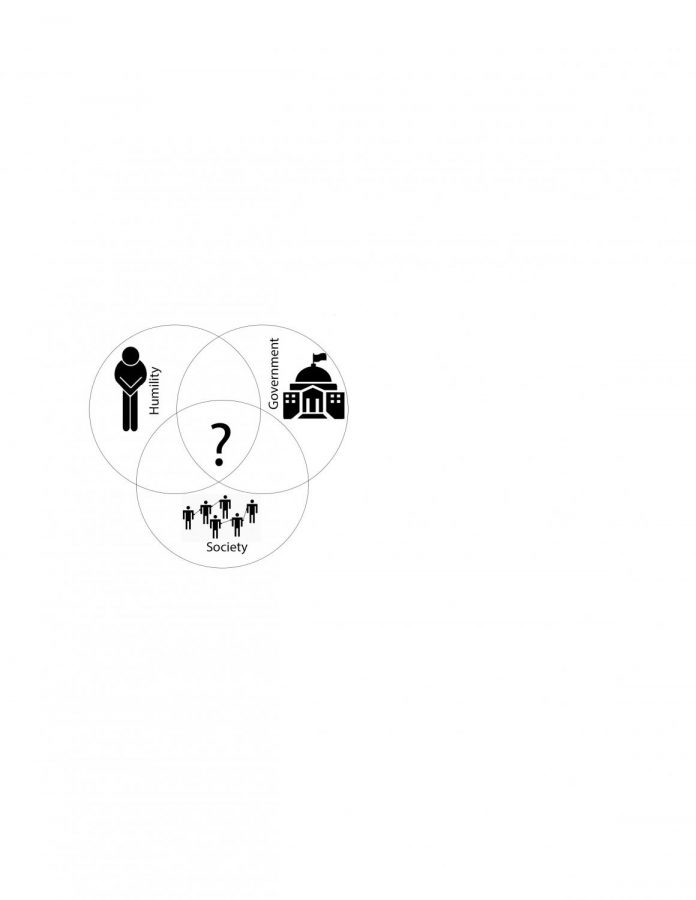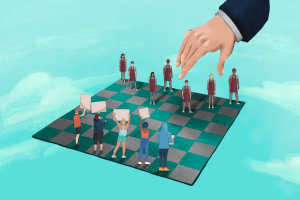Government, society, humility: Whose fault is it?
Graphic Illustration by Elliu Huang, Contributions By Audrey Wong
These 3 factors each played a role in the spread of coronavirus.
April 10, 2020
The human race, despite its extensive technological capacity and innovative capabilities, has yet to conquer the fight against COVID-19. As a result, humans have been left susceptible to this microscopic organism that is capable of causing mass panic. With more than 502,876 cases and 18,747 deaths in the U.S., people are scrambling to find face masks, hand sanitizer and food in order to last through the shelter-in-place order. The coronavirus is not only testing human immune systems, but also pushing the limits of the government, society, humanity and humility.
Amid the panicking citizens, the government is testing as many people as possible, developing medicine to counter the coronavirus and helping financially unstable families. But much to doctors’ dismay, there are still shortages of vital medical supplies, such as masks, ventilators and even test kits, in hospitals. The situation in China should have motivated people to begin preparing for a possible outbreak in the U.S., but instead, the severity of the coronavirus situation lingered in the back of people’s minds as an unlikely possibility.
On Jan. 30, the World Health Organization declared a global emergency as China had 9,692 coronavirus cases and 213 deaths. At this point, the coronavirus is still something happening in China, and people outside of Asia have only begun to pray that it doesn’t worsen. On Feb. 25, the Center for Disease and Control (CDC) warned the U.S. of an outbreak of COVID-19 if people did not act immediately.
“My father has constantly expressed his frustration toward the government for not preparing for the virus sooner,” said sophomore Kevin Li, whose father works as a doctor at Kaiser Permanente, which is taking in infected patients. “The social distancing measures were enacted too little, too late, and basic supplies, such as masks, are somewhat lacking, even in hospitals.”
To top it off, the Federal Reserve announced on March 12 that it would inject more than $1.5 trillion into the economy in an attempt to save the struggling economy. The money could have been used to secure medical supplies to prepare for the inevitable outbreak.
Despite numerous faults in the government’s response, the people are the ones who are mainly responsible for the outbreak. COVID-19 had been spreading in China since late January, but people in the U.S. did not start trying to prevent the outbreak until it was too late.
“Just weeks ago, people were still eager to meet up with friends, go see a Sharks game and dine in at a restaurant,” Li said.
People have seen the dangers of the coronavirus in China, yet they still attended events that led to the proliferation of this virus. The government’s responsibility is to enact measures and procedures to slow the spread, but the people have the responsibility to follow through with those measures. Combining a flawed government and an unconcerned population results in a catastrophe when faced with a pandemic. People knew about the spread of coronavirus and should have strictly followed the social distancing measures.
Now the human race has entered the 21st century, surrounded by life-changing technology, and it seems as though nothing can stand in man’s way. An arrogance has developed around humans, thinking that they can count on technology to always save people. This vulnerable belief has led to a society of people dependent on technology and ignorant of the real dangers of coronavirus. When the COVID-19 outbreak was only on the horizon, some people allowed their conceit to cloud their judgement, thinking that coronavirus will not conquer the superior humankind.
“People are not taking the ‘Shelter In Place’ seriously and are still going out to interact with their friends, even going on vacations or taking a trip to the beach,” said senior Angelin Lee.
As of now, there is no cure for the coronavirus other than people’s immune systems, so people should not dismiss the virus as a simple disease that will pass in a month or two.
“Even with modern-day innovations and life-saving drugs, there are going to be things humans can’t stop,” said Li. “Nature will throw us things that humans can’t help but only rely on themselves, not technology, to deal with.”
Most of the fault lies within people, in spite of ineffectual efforts from the government. The relaxed nature of the people and lack of immediate response from the government may have fueled the rapid spread. People’s arrogance and false beliefs of invulnerability strained the limits of the government and society, leading to the proliferation of the virus.




























































